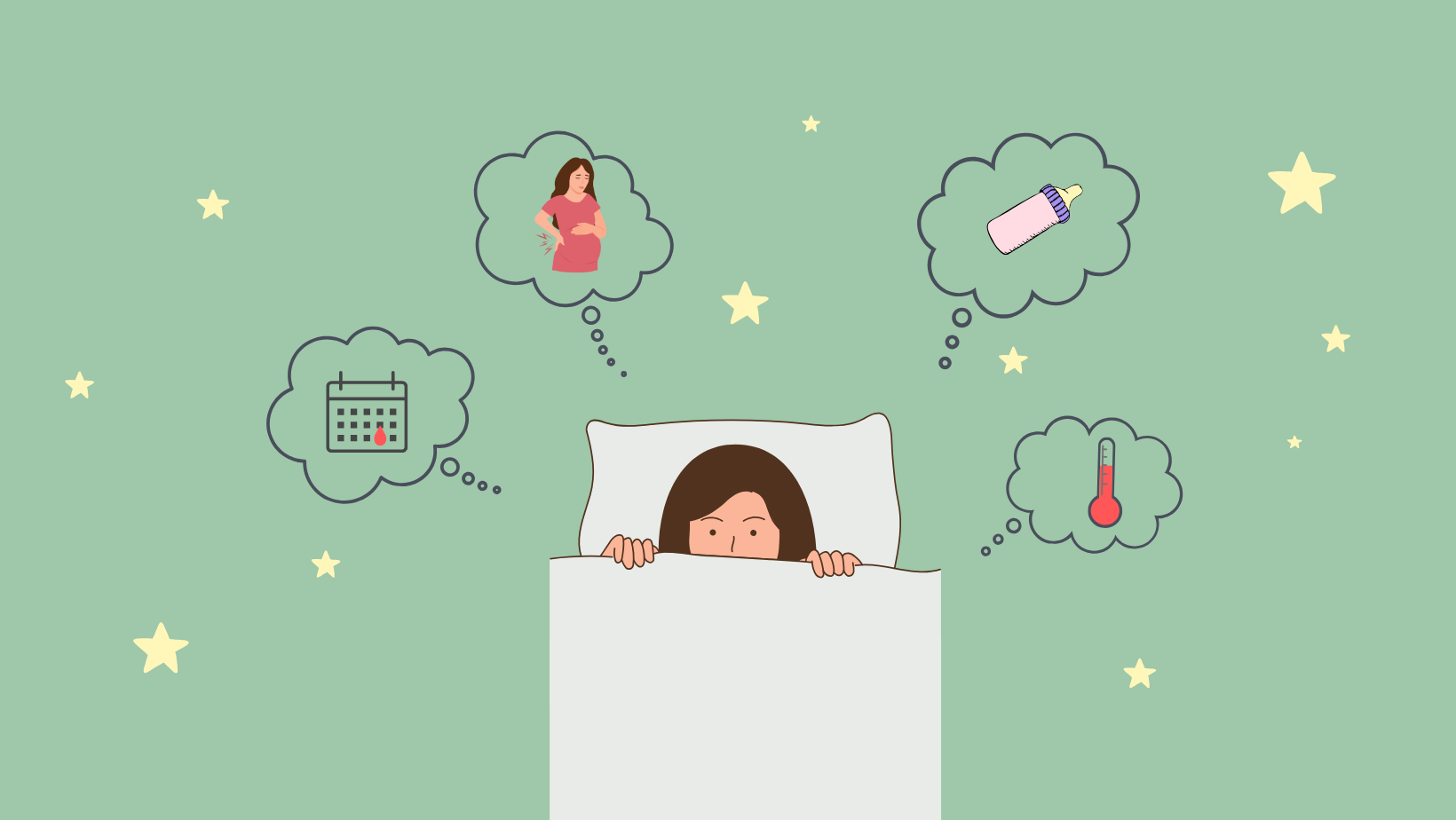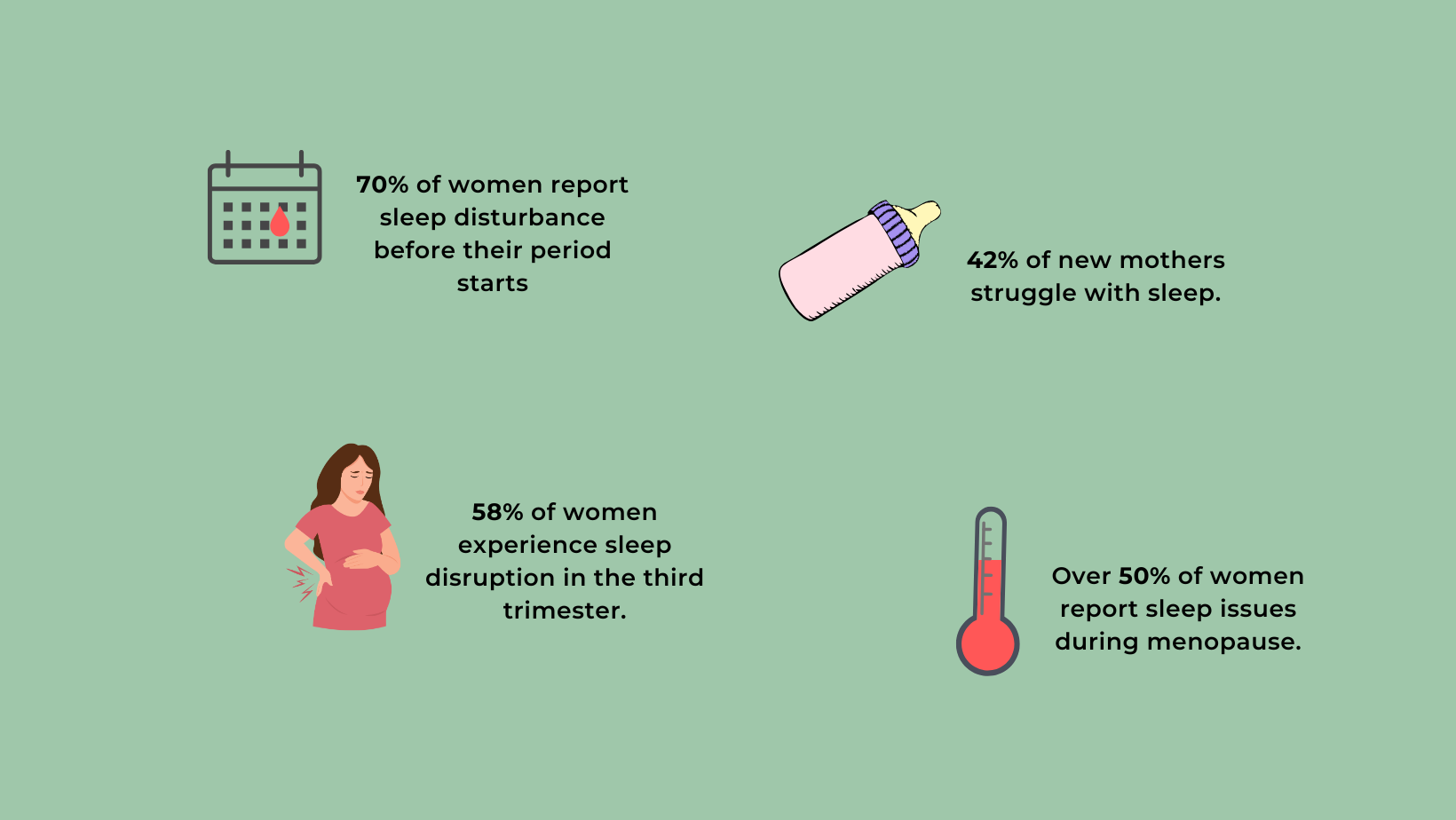Why Women Struggle with Sleep – And What We Can Do About It

You know what they say about sleep: You don't appreciate it until it's gone. Well, that has never felt more true to me than the last few weeks.
Jetlag and working full-time is a different game with a 10-month-old. Between nighttime feedings, travels, sickness, and wondering if my baby will ever figure out how to sleep through the night for more than one night, my nights feel like some endurance event – and I should know because I’ve signed up for a marathon! (Yes, I might have been overly ambitious while still sleep-deprived.)
Sleep is one of those things that we, as women, are constantly chasing – and not just when we become moms. As it turns out, biology is kind of against us here. Whether it’s menstrual cycles, pregnancy, postpartum, or menopause, sleep disturbances seem to be par for the course throughout our lives.
Hormones, Menstrual Cycles, and the Joy of Sleepless Nights
Did you know that during the premenstrual phase of our cycles, when progesterone and estrogen are doing their wild dance, many women experience restless sleep? It’s not just you! Even if you’re lucky enough to have a smooth cycle with no major PMS complaints, your body’s natural hormone fluctuations can still affect your sleep quality.
In fact, up to 70% of women report some form of sleep disturbance in the week before their period. And if you’re one of the 3–8% of women with PMDD (premenstrual dysphoric disorder), sleep issues can be even more intense, with vivid dreams and daytime fatigue taking center stage. Sleep disruptions during the menstrual cycle are real – and they’re more common than we might think.
And when we're sleep deprived, we are much more likely to make food choices that aren't the smartest, which will put us on the blood sugar rollercoaster, ....but that's for another time.
Pregnancy: A Sleep Nightmare (But So Worth It, Right?)
Pregnancy is that magical time when you’re glowing, creating life, and… not sleeping. As if the nausea, constant bathroom trips, and heartburn weren’t enough, there’s also the third-trimester insomnia that hits hard. I remember that even though I already had wild dreams before, pregnancy was a whole new level in that section, often waking up to "escape my dreams."
During pregnancy, an estimated 58% of women report significant sleep disruptions, particularly as they get closer to their due date. Factors like increased fetal movement, hip pain, and backaches make it challenging to get comfortable. And let’s not forget the 21% of pregnant women who experience insomnia severe enough to meet clinical criteria. (So, if you're feeling wiped out, you’re far from alone!)

Postpartum: Navigating Sleep with a Newborn
If you’ve just had your baby not too long ago, you know the postpartum period comes with its share of sleepless nights. The hormone drop after giving birth can definitely shake things up, and the unpredictable sleep patterns of a newborn add another layer of challenge. I’m still working on syncing my 10-month-old’s bedtime with my own sleep needs, but there are good nights and not-so-good ones.
It’s not just about losing sleep – it’s the quality of sleep that can be tricky. It doesn’t always feel as refreshing as I’d hoped even when I catch a few hours. Also, it takes much longer to fall back asleep sometimes, depending on my sleep phase when my baby wakes up. But I’ve learned that a few adjustments (and some patience) can make a big difference. It’s a process, and while it’s not perfect, experienced mums know that sleep gets better as time passes and your baby’s sleep habits mature. And until then, I will keep putting my pillow at the foot end if falling asleep will take its time.
Interestingly, a National Sleep Foundation poll found that 42% of postpartum women reported rarely getting a good night’s sleep. It’s no wonder the early months with a baby leave many of us feeling like we’re running on empty!
Menopause: Yet Another Sleep Struggle
As if all this wasn’t enough, later in life, we get to deal with menopause and its own special brand of sleep issues.
It's not just because we're waiting for the kids to come home safely after a party, it's also biological. Night sweats, hot flashes, and sleepless nights become a regular feature. Many women wake up multiple times a night, drenched in sweat, and then trying to get comfortable again – only to repeat the cycle.
Over 50% of women in perimenopause and menopause report sleep disturbances. So when we think of Menopause, it's more than hot flashes. Sleep issues are very common and not just uncomfortable – they’re exhausting and impact everything from mood to focus to energy levels.
So, What Can We Do About It?
While it might feel like the universe is conspiring to deprive us of rest, there are ways to get a better handle on sleep – even when our bodies throw curveballs.
- Sleep Hygiene: Keep your bedroom cool, dark, and quiet. I’ve found that even though my baby might wake me up, it’s a little easier to get back to sleep when the environment is comfortable, and cool.
- Caffeine Intake: Monitor your caffeine intake. I understand that a coffee or some caffeinated beverage in the afternoon may help you to stay productive but it is not the best choice to help you with your sleep quality at night. Caffeine acts fast, reaching its peak levels in the blood in about 30 minutes, but it can take hours to get rid of.
- Mindfulness and Relaxation: Yoga and mindfulness can help calm your mind before bed. Honestly, after a full day of work, mom duties, and marathon training, a few deep breaths, or a calming song go a long way.
- Cognitive Behavioral Therapy for Insomnia (CBTI): This one is a game-changer for many women struggling with chronic insomnia. It’s a non-medication approach that helps reset sleep patterns by changing how we think about sleep.
- Exercise: Regular physical activity improves sleep quality, though balancing it with fatigue (and recovery!) can be tricky. I’m trying to time my intense training runs early enough so they don’t disrupt my sleep at night. Which sometimes isn't that easy, because of daycare drop of and early work calls, but I am trying to be mindful of my needs.
- Talk to Your Doctor: If hormonal changes are keeping you awake, there are treatments available. From hormone replacement therapy (for menopause) to medications (used sparingly), there are options that can help.
Some might reach for Melatonin , the "sleep hormone", to help with sleep. And while it can be beneficial in the short term, I'd advise against it as a long-term aid. (especially in doses of more than 1mg)
Final Thoughts
Sleep is vital for everything we do – from being present with our families to performing at work and even reaching fitness goals (like training for this marathon or any other event you've been contemplating). But for us women, it’s often one of the first things to go when life gets hectic.
If you’re struggling with sleep, know that you’re not alone. Whether you’re dealing with premenstrual insomnia, pregnancy sleep woes, postpartum exhaustion, or menopausal night sweats, there are ways to improve your sleep quality – and your overall well-being. And if nothing else, let’s all remind ourselves that sleep is not a luxury – it’s a necessity. Here’s to figuring it out, one sleepless night at a time!
